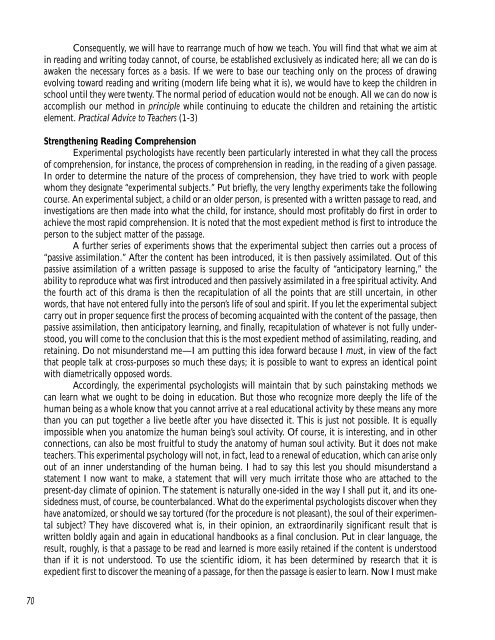Colloquium on English - Research Institute for Waldorf Education
Colloquium on English - Research Institute for Waldorf Education
Colloquium on English - Research Institute for Waldorf Education
You also want an ePaper? Increase the reach of your titles
YUMPU automatically turns print PDFs into web optimized ePapers that Google loves.
70<br />
C<strong>on</strong>sequently, we will have to rearrange much of how we teach. You will find that what we aim at<br />
in reading and writing today cannot, of course, be established exclusively as indicated here; all we can do is<br />
awaken the necessary <strong>for</strong>ces as a basis. If we were to base our teaching <strong>on</strong>ly <strong>on</strong> the process of drawing<br />
evolving toward reading and writing (modern life being what it is), we would have to keep the children in<br />
school until they were twenty. The normal period of educati<strong>on</strong> would not be enough. All we can do now is<br />
accomplish our method in principle while c<strong>on</strong>tinuing to educate the children and retaining the artistic<br />
element. Practical Advice to Teachers (1-3)<br />
Strengthening Reading Comprehensi<strong>on</strong><br />
Experimental psychologists have recently been particularly interested in what they call the process<br />
of comprehensi<strong>on</strong>, <strong>for</strong> instance, the process of comprehensi<strong>on</strong> in reading, in the reading of a given passage.<br />
In order to determine the nature of the process of comprehensi<strong>on</strong>, they have tried to work with people<br />
whom they designate “experimental subjects.” Put briefly, the very lengthy experiments take the following<br />
course. An experimental subject, a child or an older pers<strong>on</strong>, is presented with a written passage to read, and<br />
investigati<strong>on</strong>s are then made into what the child, <strong>for</strong> instance, should most profitably do first in order to<br />
achieve the most rapid comprehensi<strong>on</strong>. It is noted that the most expedient method is first to introduce the<br />
pers<strong>on</strong> to the subject matter of the passage.<br />
A further series of experiments shows that the experimental subject then carries out a process of<br />
“passive assimilati<strong>on</strong>.” After the c<strong>on</strong>tent has been introduced, it is then passively assimilated. Out of this<br />
passive assimilati<strong>on</strong> of a written passage is supposed to arise the faculty of “anticipatory learning,” the<br />
ability to reproduce what was first introduced and then passively assimilated in a free spiritual activity. And<br />
the fourth act of this drama is then the recapitulati<strong>on</strong> of all the points that are still uncertain, in other<br />
words, that have not entered fully into the pers<strong>on</strong>’s life of soul and spirit. If you let the experimental subject<br />
carry out in proper sequence first the process of becoming acquainted with the c<strong>on</strong>tent of the passage, then<br />
passive assimilati<strong>on</strong>, then anticipatory learning, and finally, recapitulati<strong>on</strong> of whatever is not fully understood,<br />
you will come to the c<strong>on</strong>clusi<strong>on</strong> that this is the most expedient method of assimilating, reading, and<br />
retaining. Do not misunderstand me—I am putting this idea <strong>for</strong>ward because I must, in view of the fact<br />
that people talk at cross-purposes so much these days; it is possible to want to express an identical point<br />
with diametrically opposed words.<br />
Accordingly, the experimental psychologists will maintain that by such painstaking methods we<br />
can learn what we ought to be doing in educati<strong>on</strong>. But those who recognize more deeply the life of the<br />
human being as a whole know that you cannot arrive at a real educati<strong>on</strong>al activity by these means any more<br />
than you can put together a live beetle after you have dissected it. This is just not possible. It is equally<br />
impossible when you anatomize the human being’s soul activity. Of course, it is interesting, and in other<br />
c<strong>on</strong>necti<strong>on</strong>s, can also be most fruitful to study the anatomy of human soul activity. But it does not make<br />
teachers. This experimental psychology will not, in fact, lead to a renewal of educati<strong>on</strong>, which can arise <strong>on</strong>ly<br />
out of an inner understanding of the human being. I had to say this lest you should misunderstand a<br />
statement I now want to make, a statement that will very much irritate those who are attached to the<br />
present-day climate of opini<strong>on</strong>. The statement is naturally <strong>on</strong>e-sided in the way I shall put it, and its <strong>on</strong>esidedness<br />
must, of course, be counterbalanced. What do the experimental psychologists discover when they<br />
have anatomized, or should we say tortured (<strong>for</strong> the procedure is not pleasant), the soul of their experimental<br />
subject? They have discovered what is, in their opini<strong>on</strong>, an extraordinarily significant result that is<br />
written boldly again and again in educati<strong>on</strong>al handbooks as a final c<strong>on</strong>clusi<strong>on</strong>. Put in clear language, the<br />
result, roughly, is that a passage to be read and learned is more easily retained if the c<strong>on</strong>tent is understood<br />
than if it is not understood. To use the scientific idiom, it has been determined by research that it is<br />
expedient first to discover the meaning of a passage, <strong>for</strong> then the passage is easier to learn. Now I must make

















